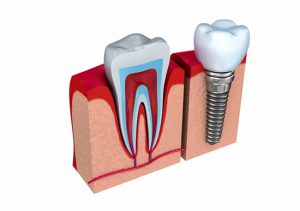Maintaining Healthy Dental Implants
Teeth implants can last for twenty years or more but need appropriate care
 Dental implants are a growing market with more and more people choosing them as their preferred tooth replacement option. Whilst dentures and bridges continue to be used by a significant number of people, we believe that implants may well overtake them as a first choice option due to their practicality and longevity.
Dental implants are a growing market with more and more people choosing them as their preferred tooth replacement option. Whilst dentures and bridges continue to be used by a significant number of people, we believe that implants may well overtake them as a first choice option due to their practicality and longevity.
Out of the three types of tooth replacement methods available, dental implants are also the easiest to maintain. Both dentures and bridges can be quite fiddly to keep clean, and in the case of dentures especially, may become damaged when cleaning if dropped. Implants, once secured in place, should be the most straightforward to keep clean and healthy.
Despite this ease of maintenance, it is still a very important thing to do and neglecting to do so can lead to infections and, ultimately, failure of the implant. To help our Wickford patients maintain good oral health and protect their implants, we have put together a basic guide to maintaining healthy dental implants.
Post implant procedure
Your new implants are perhaps most vulnerable in the first few months after they have been placed. During this time you will need to take special care of them including being careful about what you eat.
Your initial diet will need to be very soft in nature that puts no strain at all on your new implant. This might seem a little boring but it is for a short period of time out of the twenty year plus lifespan, and your long term goal should be kept in mind. Rather than wonder what you are going to eat once you have had your treatment, it is worth looking into foods you can eat beforehand and planning accordingly. For example, you could make and freeze a number of different soups to help your diet be more varied and interesting.
As time goes on, you will be able to introduce slightly firmer foods into your diet such as mashed potato and well cooked pasta (not al dente) and gradually, as the implant becomes more established, start to eat slightly harder foods. After approximately three or four months you should be able to return to your usual diet as directed by your dentist.
Cleaning
It is very important to keep your dental implant and the surrounding area clean. Although the implant and the attached crown can’t decay, there is still a risk of gum disease. This, along with peri-implantitis, a similar issue which affects implants, is the biggest threat to your new tooth replacement and can cause it to fail, even years after it has been placed and become fully integrated.
The good news is that keeping your implant clean is really not that hard and simply requires you to be diligent about your oral health.
You will be required to stop smoking for a period of time both before and after your implant placement but you should also seriously consider stopping altogether. Smoking is one of the biggest factors that lead to gum disease and is why you are required to stop during the treatment period. Although this is a time when your implant is most vulnerable, continuing to smoke afterwards still greatly increases the risk of problems that could cause your implant to fail.
Other than this, you will need to clean your teeth well, twice a day, as you should already be doing, paying special attention to the gums surrounding your teeth/implant. If you don’t already, you should be flossing between your teeth and around the implant on a daily basis. Finally, regular cleaning by the hygienist at our Wickford dental practice will really help to keep gum disease at bay and help you to maintain a healthy implant as well as healthy teeth and gums.
It should go without saying that you will also need to see your dentist at regular intervals to monitor your new tooth replacement and oral health in general. Providing that you take care of your implant, it is unlikely that there will be any problems but it should still be monitored when you visit for your six monthly check up at the Cygnet Dental Practice.
If you are considering having a tooth implant to replace a missing natural tooth or teeth, why not arrange an initial consultation with one of our dentists? You will be able to discuss the treatment options as well as the treatment plans that we have available to help you to spread the cost. You can arrange your initial consultation by calling the Cygnet Dental Practice on 01268 733078 and our team will be pleased to help!
